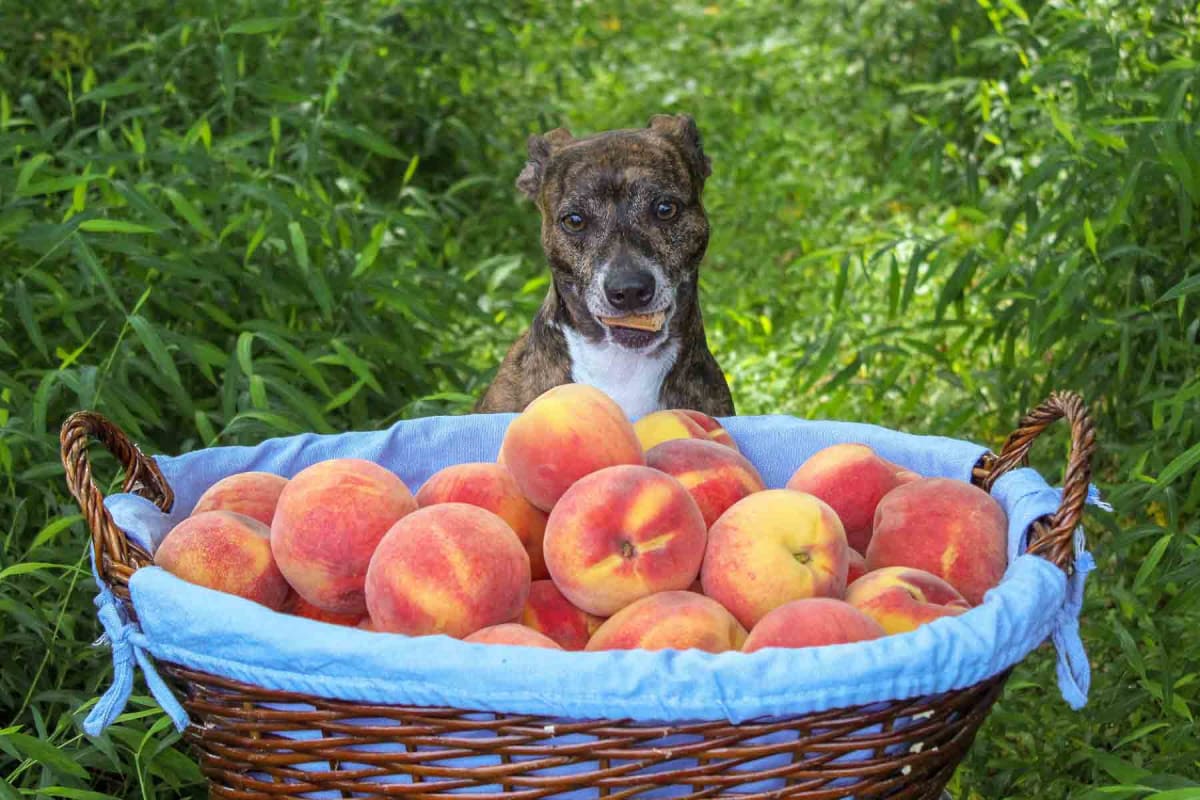
Can dogs eat peaches?
Can dogs eat peaches?
Can dogs have peaches?
If you've ever caught your pup eyeing your peach slices with those irresistible puppy eyes, you might be curious whether peaches are safe for canine consumption. Yes, dogs can eat peaches in moderation! The fruity flesh of peaches is non-toxic to dogs and can actually be a refreshing summer treat.
However, not all parts of the peach are safe, and there are important guidelines to follow when sharing this fruit with your four-legged companion. The pit, stems, and leaves contain amygdalin, which breaks down into cyanide when ingested—a substance that's toxic to both humans and dogs.
Are peaches good for dogs?
Peaches can offer several health benefits for dogs when given in small amounts. These fruits are rich in fiber and contain essential vitamins and minerals that can contribute to your dog's overall health. Some of the potential benefits include:
Vitamin A for eye health and immune function
Vitamin C for immune support
Fiber for digestive health
Antioxidants for cellular health
High water content for refreshing hydration
Additionally, peaches are relatively low in calories compared to many commercial dog treats, making them a healthier alternative when you want to reward your pup without contributing to weight gain.
When are peaches bad for dogs?
While peaches can be a healthy treat, there are situations where they can be harmful to dogs:
Peach pits, stems & leaves: The pit or stone of a peach is extremely dangerous for dogs. It's a choking hazard, can cause intestinal blockages if swallowed, and contains small amounts of cyanide-producing compounds. Peach stems and leaves also contain these same toxic compounds, so keep them away from your dog.
Excessive consumption: Too many peaches can lead to gastrointestinal upset, including diarrhea or vomiting, due to their high sugar and fiber content.
Canned peaches: Canned or preserved peaches contain high levels of sugar, artificial sweeteners (some of which, like xylitol, are toxic to dogs), or preservatives.
Peach-flavored products: Avoid giving your dog peach-flavored human foods, as they may contain artificial sweeteners or other harmful ingredients.
Dogs with certain health conditions, such as diabetes or obesity, should have limited access to peaches due to their natural sugar content. Some dogs may also have allergic reactions to peaches, though this is relatively rare.
How to safely prepare peaches for your dog
Follow these steps to safely offer peaches to your dog:
Choose a ripe, fresh peach.
Wash the peach thoroughly to remove any pesticide residues, dirt, or other contaminants.
Remove the pit, stem, and leaves, as these parts contain poisonous cyanide and are choking hazards.
Peel the skin off to make it easier for your dog to digest.
Cut the peach into small, bite-sized pieces to prevent choking.
Offer a small amount as a treat, not as a meal replacement.
How many peaches can I feed my dog?
Even healthy treats like peaches should make up no more than 10% of your dog's daily caloric intake. For small dogs, a few small slices occasionally is plenty. Medium to large dogs might enjoy up to a quarter or half of a peach, depending on their size and activity level.
Remember that peaches contain natural sugars, which can contribute to weight gain, diabetes, and dental issues if consumed in excess. It's best to offer peaches as an occasional treat rather than a daily addition to your dog's diet.
Can dogs eat canned peaches?
It's best to avoid feeding your dog canned peaches. Most commercial canned peaches are packed in heavy syrup with added sugars that aren't healthy for dogs. Some canned fruits may also contain artificial sweeteners like xylitol, which is extremely toxic to dogs even in tiny amounts.
If you don't have fresh peaches available, frozen peaches without added sugar are a better alternative than the canned variety.
Can dogs eat peach skin?
While peach skin isn't toxic to dogs, it can be difficult for some dogs to digest. The fuzzy texture might cause gastrointestinal upset in dogs with sensitive stomachs. Additionally, unless you're buying organic peaches, the skin may contain pesticide residues.
If you do choose to feed peach skin to your dog, make sure to wash the fruit thoroughly first. For dogs with sensitive digestive systems, it's safer to remove the skin before offering peach slices as a treat.
Can dogs eat nectarines?
Yes, dogs can eat nectarines in moderation. Nectarines are essentially peaches without the fuzzy skin and share the same nutritional profile. The same precautions apply—remove the pit, stems, and leaves, which contain small amounts of toxic cyanide-producing compounds. Offer only small portions of nectarines as an occasional treat.
Like peaches, nectarines contain natural sugars, so limit consumption if your dog has weight issues or diabetes. Always introduce new fruits gradually and monitor your dog for any signs of digestive upset or allergic reactions.

Other safe dog treat alternatives
If your dog enjoys fruit treats, there are several other fruits dogs can eat in moderation, including:
Apples (without seeds or core): Provide vitamin C, fiber, and help clean teeth
Blueberries: Packed with antioxidants and make great training treats
Watermelon (seedless): Hydrating and refreshing in hot weather
Strawberries: Contain fiber, vitamin C, and an enzyme that can help whiten teeth
There are many vegetables that are safe for dogs to eat as well, such as carrots, cucumber slices, and green beans. Always remember that while fruits and vegetables can be healthy additions to your dog's treat rotation, they should complement a complete and balanced dog food diet, not replace it.